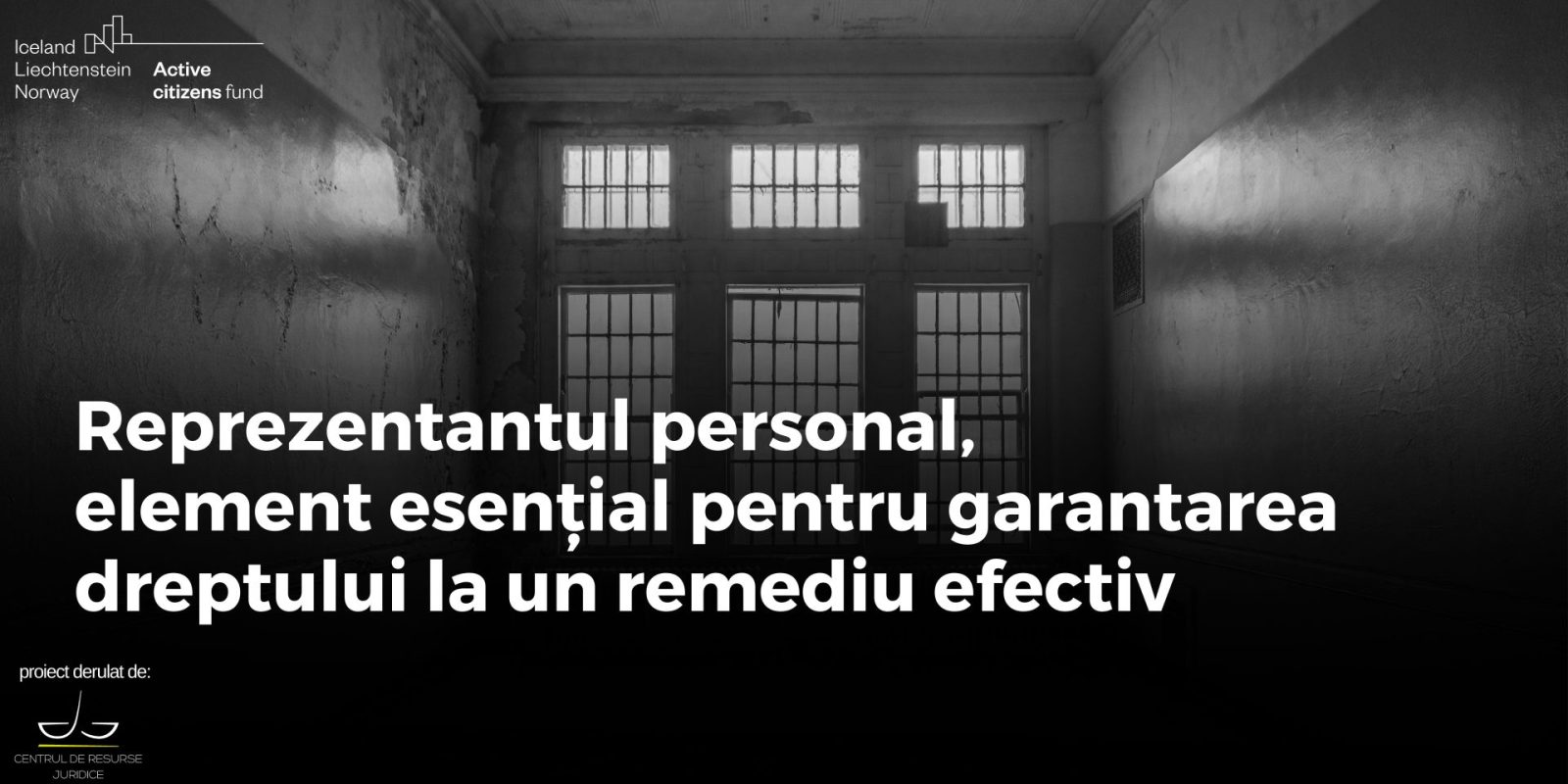- Background
About 10 years ago, the Grand Chamber of the European Court of Human Rights condemned Romania in the case “CLR on behalf of Valentin Câmpeanu”[1] for violating Article 2 of the Convention – the right to life (both under substantive and procedural matter) – and Article 13 of the Convention – the right to an effective remedy – and ruled that Romania must take general measures to ensure that persons in situations similar to Valentin Câmpeanu’s will not suffer the same violations of the fundamental rights recognised by the Convention.
Of course, in connection with the judgment delivered in the case CLR on behalf of Valentin Câmpeanu against Romania, we can have wide-ranging discussions that take us through most of the fundamental rights and freedoms, as long as Valentin Câmpeanu’s story is all the more tragic as all his life he has been in the care of the state, through its institutions and authorities, under the alleged appearance of having access to care, resources and remedies tailored to his needs.
Valentin Câmpeanu died on the evening of 20 February 2004, a few months after his 18th birthday. He had spent his whole life in children’s homes and foster homes after being abandoned at birth.
The Court notes that Mr. Câmpeanu “was diagnosed as “profoundly mentally retarded, IQ = 30, HIV infection”, was classified as having a “severe” disability. Subsequently, he developed various HIV- related symptoms, such as pulmonary tuberculosis, pneumonia and chronic hepatitis”. On his 18th birthday, through a series of administrative procedures carried out without his participation, consultation or representation, and without having a guardian appointed, he ends up being transferred successively between the Poiana Mare Psychiatric Hospital and the Cetate Medical and Social Unit, each of these institutions claiming that they cannot provide care and treatment for Mr Câmpeanu. He spent the last days of his life in the Poiana Mare Psychiatric Hospital in inhuman and degrading conditions, all the more so as he was admitted to a hospital, “alone in an unheated room, wearing only a pyjama top and in a bed without underwear; he could not feed himself and could not go to the toilet on his own; the SPM staff refused to assist him, fearing that they might contract HIV, so that the patient was fed only with glucose in an infusion”[2].
Without commenting on the entire factual situation and the national proceedings following which CLR addressed the European Court of Human Rights on behalf of Valentin Câmpeanu, we would like to focus our attention on some of the considerations on the basis of which the Court condemned Romania for violating Valentin Câmpeanu’s fundamental rights:
“160. In the present case, the Court recalls that, as the authorities had not appointed a legal guardian or other representative, no form of representation was applied or available to protect Mr. Câmpeanu or to make representations on his behalf before the hospital authorities, the national courts or the Court (supra, para. 111). In view of the exceptional circumstances which led to its decision to allow CLR to act on the young man’s behalf (conclusion made supra, para.112), the Court also found a violation of Article 13 in conjunction with Article 2, on the ground that the State had not guaranteed and implemented a legal framework allowing for the examination by an independent authority of Mr. Câmpeanu’s heads of claim (supra, para. 150-153; see also paragraph 154 on the heads of claim under Article 3, considered separately and in conjunction with Article 13). Thus, the facts and circumstances which led the Court to find a violation of Article 2 and Article 13 reveal the existence of a broader problem which requires it to indicate general measures for the execution of the judgment.
161. In this context, the Court recommends that the respondent State should consider the general measures necessary to ensure that persons with mental disabilities who are in a situation comparable to that of Mr. Câmpeanu are provided with independent representation enabling them to pursue their heads of claim under the Convention, in relation to their health and provided treatment, before a court or any other independent body (see, mutatis mutandis, supra, p. 113, and Stanev, cited above, para. 258).”
Hence, in addition to the fact that Mr. Valentin Câmpeanu’s right to life had been violated, the Court held that he had also been violated of his right to an effective remedy, recognised by Article 13 of the Convention, while Mr. Câmpeanu’s situation made it impossible for him to complain of any abuse or to claim any right before a court. Of course, this conclusion of the Court is consistent with the provisions of Article 13 of the Convention on the Rights of Persons with Disabilities[3] which impose a positive obligation on signatory states – to ensure procedural adjustments that guarantee effective access to justice also for persons with disabilities on an equal basis with others.
In the case CLR on behalf of Valentin Câmpeanu there is a Concurring Opinion by Judge Pinto De Albuquerque which states that “it is necessary that extremely vulnerable persons who have been prevented in any way (in any way in the English version) from exercising their rights – that is, by an act or omission on the part of the respondent State – be offered other means of access to the Court. In fact, the present case is a perfect example of a continuing omission on the part of the respondent State, which, by failing to provide Mr. Câmpeanu with any form of legal representation or guardianship during his lifetime, even though there was a credible complaint against him concerning the medical treatment and education provided to the young man, effectively prevented him from exercising the rights guaranteed to him by the Convention and domestic law.”
2. The question of law
In order to prove the execution of the State’s obligations under the judgment CLR on behalf of Valentin Câmpeanu, Romania must present a coherent action plan that can be implemented. In the summer of 2023, in one of the documents communicated to the Department for the Execution of Judgments of the European Court of Human Rights[4], the Romanian authorities stated that “according to the information provided by the Ministry of Justice (MJ) on this issue, Law no. 140/2022 represents a very important legislative progress, which aligns the national legislation on the protection of vulnerable persons with the latest developments in the practice of the ECHR and the Constitutional Court. The new law places at the centre the persons benefiting from the protection regime and emphasises respect for dignity, rights and freedoms, the person’s will, needs and preferences, and the defence of personal autonomy.”
It is true that the amendments introduced by Law 140/2022 completely change the paradigm of the old regulation, that of the institution of interdiction, which was declared unconstitutional, offer a different perspective on civil capacity of exercise and provide new tools that allow a proportionate and adequate protection for persons who cannot take care of their own interests.
However, the mere drafting and adoption of Law 140/2022 does not fully solve the systemic problems found by the European Court of Human Rights in the case CLR on behalf of Valentin Câmpeanu. Thus, although Art. 170 para. (2), (3) and (4),of the Civil Code [5] provides that “In the absence of an appointed guardian, the guardianship court shall appoint as guardian in priority, unless there are good reasons for not doing so, the spouse, parent, relative, friend or person living with the protected person, if the appointed person has close and stable ties with the protected person, is capable of fulfilling this task, taking into account, where appropriate, the ties of affection, personal relations, material conditions, the moral guarantees of the person called upon to be appointed guardian and the proximity of their homes or residences. (3) If none of the persons provided for in para. (2) cannot assume the guardianship, the guardianship court appoints a personal representative who has acquired this capacity under the conditions of the special law (4) When appointing the guardian, the court shall take into account the preferences expressed by the person protected, his or her usual relations, the interest shown in his or her person, as well as any recommendations made by persons close to him or her, and the absence of interests contrary to those of the person protected.”, Art. 26, para. (2) of Law 140/2022 stipulates that the provisions of Art. 170 para. (3) of the Civil Code shall enter into force on the date to be provided by the special law on the personal representative.
Hence, although Law 140/2022 introduces the institution of the personal representative (which aims to resolve situations similar to Valentin Câmpeanu’s, where there are no close persons who can ensure the representation of the person with a disability who cannot look after his or her interests and who cannot exercise his or her rights on his or her own), this solution is not yet viable, being postponed until a special law on the personal representative is adopted.
As such, although the Court’s conclusions are clear, today, 20 years after Valentin Câmpeanu’s death and 10 years after Romania’s conviction, there is still no concrete, clear and effective mechanism in our system of national law to prevent the recurrence of such cases.
3. Current situation
Of course, the main problem arising from all the above is to determine what happens to persons who find themselves in situations similar to Valentin Câmpeanu’s until the legislator adopts a law on the personal representative. In other words, for those who do not have any close persons who can assume the role of guardian – either in the framework of special guardianship or in the framework of legal consultation, who will be able to represent the interests of these persons and ensure that they have access to a court to report an abuse or to ask for a right to be respected?
At first glance, we could conclude that there is a legislative vacuum, as long as until we have regulated the institution of the personal representative we cannot identify persons who meet the necessary criteria for appointment as guardian, curator or protector.
However, there are opinions that the solution to this problem is Article 25 of Law 448/2006 on the protection and promotion of the rights of persons with disabilities, which states that “(4) If the person with a disability has no relatives or persons who accept guardianship, the court may appoint as guardian the local public administration authority or, as the case may be, the private legal person providing protection and care for the person with a disability.”
It is true that the provisions of Article 25, para. (4) of Law no. 448/2006 have not been explicitly repealed by Law no. 140/2022, but, in view of the above considerations, as well as in view of the principles laid down by Law no. 140/2022, it seems that the legislator’s vision is to eliminate altogether the situations in which vulnerable persons who cannot exercise their rights on their own are represented by institutions and to introduce representation by persons specially appointed by the courts to exercise these duties.
On the one hand, we do not see how the provisions of Art. 25 para. (4) of Law no. 448/2006 serve the purpose set by the legislator in adopting Law no. 140/2022, as long as they do not address the systemic problems identified by the European Court of Human Rights in the case CLR on behalf of Valentin Câmpeanu v. Romania, where, among other things, the Court pointed out the need to ensure independent representation that would allow them to bring any abuse or violation of the fundamental rights of persons with disabilities requiring protection before the competent courts.
However, there is no doubt that in this case there can be no question of independent representation, as long as the court would appoint as guardian the authority which is also responsible for the care and assistance of the person with a disability. In other words, for a person with a disability who is under the care of the State (through its institutions), the appointment of a State authority as guardian is likely to create a clear conflict of interest, as long as there is even partial overlap between the institution providing care for the person with a disability and the institution which should be supervising the way in which that care is carried out. In particular, it seems unlikely that the authority responsible for or contributes in any way to the violation of the fundamental rights of a person with a disability would bring a case before the court to establish such abuse.
It follows from the decisions of the European Court of Human Rights in the case CLR on behalf of Valentin Câmpeanu v. Romania that only by appointing an independent representative, i.e. a natural person and not an institution, could a vulnerable person be considered to be provided with an effective representation. In this respect, it is recalled that one of the basic principles developed by the European Court of Human Rights in its case law is that the right of access to a court must be “concrete and effective” and not “theoretical and illusory”[6].
On the other hand, even if we accept that this article can be applied by analogy, we would point out that para. (4) of Article 25 of Law 448/2006 provides a right and not an obligation for the court dealing with such a request. As such, the court may take this option into account, resorting to it only if it considers it appropriate. However, if the court finds a conflict of interest between the person in need of protection and the local public administration authority, it would not be able to apply paragraph (4) of Art. 25 of Law 448/2006 and would find itself in the same problematic situation of lack of effective instruments to ensure protection. For these cases, the current legislative framework has no solutions.
Until the adoption of a law regulating the institution of the personal representative, despite the beneficial changes brought by Law 140/2022, no one can guarantee that there are no other cases similar to Valentin Câmpeanu in Romania today.
Hence, the considerations set out by Judge Pinto De Albuquerque[7] some 10 years ago remain relevant: “this situation revealed the existence of an intolerable legal vacuum in terms of the protection of human rights, given Mr. Câmpeanu’s situation of extreme vulnerability throughout his life, the absence of close relatives, guardians or legal representatives, and the fact that the respondent State refused to investigate the young man’s death and to bring to justice those who are responsible. The existence of this legal black hole, in which extremely vulnerable victims of serious human rights violations committed by agents of the State can wander their entire lives without any means of exercising their rights, justifies a principled response from the Court.”
Author: lawyer Irina Mihale
[1] ECHR, JUDGEMENT of 17 July 2014, Centre for Legal Resources on behalf of Valentin Câmpeanu against Romania, URL: http://hudoc.echr.coe.int/eng?i=001- 145577#{%22display%22:[%220%22],%22languageisocode%22:[%22RUM%22],%22appno
%22:[%2247848/08%22],%22itemid%22:[%22001-147826%22]}
[2] As the Court held in para. 23 of the Judgment, citing the report drawn up by CLR, following the monitoring visit which took place on 20 February 2004, a few hours before the death of Mr Valentin Câmpeanu.
[3] Article 13 of the Convention on the Rights of Persons with Disabilities, published in the Official Journal No 792 of 26 November 2010.
Access to justice
1. States Parties shall ensure effective access to justice for persons with disabilities on an equal basis with others, including by providing procedural and age-appropriate adjustments to facilitate their active role as direct and indirect participants, including as witnesses, in all legal proceedings, including the investigative and other preliminary stages.
[4] Information note on general measures required in the group of cases CLR on behalf of Valentin Câmpeanu, Parascineti, N., N No 2, R.D. and I.M.D. and Cristian Teodorescu v. Romania, available at hudoc.exec.coe.int, URL: https://hudoc.exec.coe.int/eng?i=DH-DD(2023)354E, accessed on 10.01.2024;
[5] As amended by Law No 140/2022;
[6] ECHR, Bellet v. France, 04.12.1995, URL: https://hudoc.echr.coe.int/fre?i=001-62507, accessed on 10.01.2024;
[7] Paragraph 3 of the Concurring Opinion of Judge Pinto De Albuquerque (part of the Judgment of the Grand Chamber of the European Court of Human Rights in the case CLR of Valentin Câmpeanu v. Romania) in which he indicated his dissatisfaction that the majority chose to address the legal question at issue in a case-by-case and limited manner, ignoring the need for a firm statement on a matter of principle.



